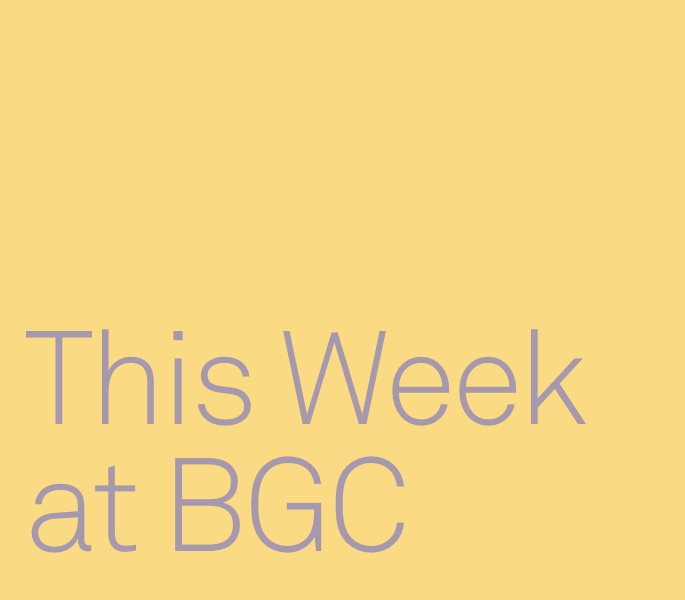|
|

|
|
|
|
Ritual of Ornament
February 15 at 12:15 pm
Zoom
Jazmine Catasús (BGC 2021–22 Library Artist-in-Residence) examines the role of ornamentation in building knowledge systems. Her project delves into how we manipulate matter to enhance political power, to affirm identity, and to connect with the cosmos. Catasús is interested in the actions we take to include the decorative in our lives and how it functions in psychological and physical spaces.
|

|
Mind Over Matter? Exploring Making: Rhythm
February 15 at 6 pm
Zoom
From the methodical gestures of the maker to the give-and-take of the material, rhythmic motion has always been at the heart of the making process. This session of “Mind Over Matter” explores how we can read the rhythms of the creative process within the object itself, whether produced by hand or by machine. Join BGC PhD students Geoffrey Ripert and Nicholas de Godoy Lopes with guest speaker Drew Thompson.
|

|
The Dutch Colonial Imaginary
February 15 at 6 pm
Zoom
Claudia Swan’s (Washington University) recent book on early modern Dutch investment in the exotic—Rarities of these Lands. Art, Trade, and Diplomacy in the Dutch Republic (Princeton, 2021)—explores how rarities were obtained, exchanged, stolen, valued, and collected, tracing their global trajectories and considering their role within the politics of the new state. This lecture builds on that account through an examination of power relations less explicitly operative within Dutch culture of the time: slavery, Swan argues, was an animating force of the Dutch colonial imaginary.
|

|
Puppets, Objects, and Modernity
February 16 at 12:15 pm
Zoom
Puppeteer and theater historian John T. Bell considers the power and agency of objects in modernist contexts—especially puppets, masks, and performing objects—and the difficulties modernity and modernism have had in recognizing and accepting such aspects of material culture.
|

|
The triad of cultures that make Dominican culture are muddled. As a young immigrant, Lissy Mineo-Gonzalez (BGC 2021–22 Library Artist-in-Residence), lost out on learning her ancestral history on the small Caribbean island. “Reckoning with Erasure” is a talk that traces back her roots, celebrates the matriarch that brought her to New York City, and examines both the personal and historical loss of culture caused by multiple forces.
|

|
Next Week:
Zoom
The Fatimids (909-1171) transformed the art of woodcarving, adorning the interiors of their mosques, palaces, churches, and synagogues with delicately carved figural scenes and intricate foliate motifs and geometric patterns. Today, the fragmentary remains of this vibrant tradition of wood decoration are dispersed internationally across museum collections as well as in situ in the extant monuments of Fatimid Egypt. Combining art historical and technical investigation, Ariel Fein explores the ways in which wood was conceived and consumed in Fatimid Egypt.
|

|
Mordechai Feingold (California Institute of Technology) underscores the importance of classroom ‘furniture’ for better appreciation of the contribution of early modern institutions of higher learning to the dissemination and to the advancement of scientific knowledge.
|

|
Indigenous Theories of Indigenous Arts in Transition
February 22 at 6 pm
Zoom
In Aotearoa, New Zealand, debates in art history, anthropology, museum studies, and curatorial writing have circled around the changing forms of “Māori art”: from “traditional”/customary practices such as weaving and carving, to “Māori modernism,” to “contemporary Māori art.” This lecture, presented by Conal McCarthy, considers two moments in this dynamic history.
|


|
The Color of Modernism
February 24 at 12:15 pm
Zoom
One of the most enduring and pervasive myths about early modernism is that it was white. This talk, presented by Deborah Ascher Barnstone (University of Technology Sydney) and based on a new book with the eponymous title, will dismantle the myth of whiteness by examining five different theoretical interpretations of scientific and artistic color theory advanced by members of the German avant-garde.
|

|
COPY AND PASTE CODE BELOW TO MAILCHIMP
|